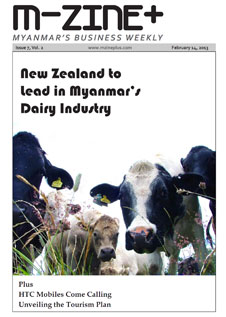The distant South Pacific island nation of New Zealand is making its mark on Myanmar soil and looking to transfer its agricultural prowess in milk production and dairy manufacturing to farmers in the Southeast Asian country.
 New Zealand’s Prime Minister John Key recently toured Myanmar’s major cities of Yangon and Naypyitaw and pledged NZ $6 million in development funding for a model dairy farm, the first of its kind in Myanmar.
New Zealand’s Prime Minister John Key recently toured Myanmar’s major cities of Yangon and Naypyitaw and pledged NZ $6 million in development funding for a model dairy farm, the first of its kind in Myanmar.
Mr Key, the first ever New Zealand prime minister to visit Myanmar, met with high-ranking officials including President Thein Sein and opposition leader Aung San Suu Kyi during his three day visit in November 2012.
His entourage included New Zealand’s Ambassador to Myanmar, Thailand, Laos and Cambodia, Tony Lynch and Trade Commissioner Karen Campbell.
M-ZINE+ Senior Reporter Victoria Bruce sat down with Ambassador Lynch and Ms Campbell in their Bangkok headquarters to discuss the commercial significance of New Zealand’s re-engagement with Myanmar and how New Zealand aims to step up its role in assisting Myanmar’s economic development.
While New Zealand’s aid contribution to Myanmar is modest compared to major donors such as the United Kingdom and Australia, Ambassador Lynch says his island nation will make their mark by sticking to what they do best—exporting their dairy and agribusiness expertise to assist local farmers improve production.
Dairy farming is New Zealand’s largest export earner, with dairy products accounting for a solid 21 percent of merchandise in 2009, surpassing wool exports.
New-Zealand-dairy
The country's largest company, Fonterra, controls almost one-third of the international dairy trade, and recently appointed a permanent country manager for Myanmar to help the Group explore the potential opportunities amongst Myanmar’s untapped market of some 60 million people.
Popular New Zealand dairy brands such as Fonterra’s flagship Anchor brand of butter line the shelves of Yangon’s supermarkets and as the purchasing power of Myanmar’s consumer market increases, New Zealand can expect demand for its high quality calcium-rich dairy products to grow.
Over the coming five years, their flagship project in Myanmar will be the model dairy farm, which aims to engage 20 to 25 local farmers, each with around 10 dairy cows, in a small-scale cooperative farming basis.
New Zealand dairy experts will assist with quality control, feedstock, milk processing and development and general expertise and guidance on the cattle’s upkeep.
“A study completed last year identified that dairy was the area where we should concentrate on in Myanmar,” Ms Campbell said.
“The feedback from Myanmar side is they want help on improving the quality of the livestock and gaining better understanding on feeding programs, such as different types of grass and fertilizers and the collection and processing and development of milk products,” she said.


